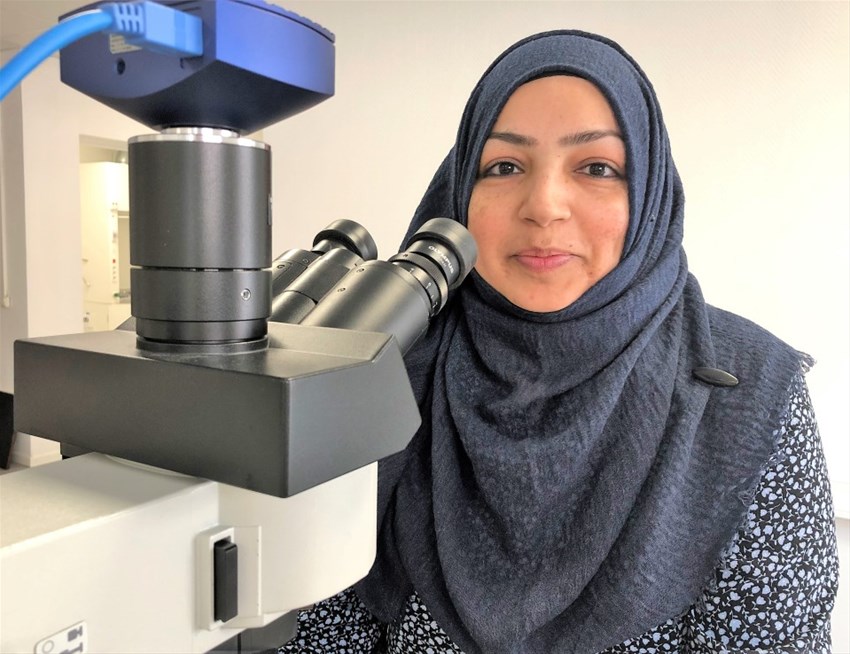Tahira's research – one step closer to climate-smart aircraft engines
25 May 2020
Tahira Raza's research opens up entirely new opportunities to make air- and spacecraft engines more environmentally friendly. She is one of the few in the world to study the weldability of components produced by additive manufacturing with powder bed. It is an important piece to the puzzle that would allow industry to build lighter aircraft engines and space applications faster and more efficiently.

Climate-smart materials and production processes are at the top of the agenda for the aerospace industry. There is great interest in laser-based additive manufacturing with powder bed (L-PBF) as it can complement other manufacturing methods such as casting and forging. University West has been conducting cutting edge research in this manufacturing method for several years.
In simple terms, the component is built up by melting metal powder with laser as an energy source. The advantages of L-PBF are that you can produce products with more complex geometries and lighter designs more efficiently than with other methods. It requires less material and energy, it is faster and is more environmentally friendly. However, in order for the manufacturing method to be approved by the aerospace industry, it must meet the extreme standards on quality set by the industry.
First with research on weldability
With her recent dissertation, doctoral student Tahira Raza strengthens the university's already solid knowledge regarding additive manufacturing with L-PBF for alloy 718. She has looked at which process parameters work best for this manufacturing method and is the first to study the weldability of components built in alloy 718.
– Manufacturers want to be able to weld together small parts made with L-PBF to build larger, more complex components, such as parts for aircraft engines. A crucial factor is how the material is affected when welding in it. Materials react in different ways and it is necessary to eliminate defects in the final product, Tahira explains.
– In the microstructure formed in alloy 718 during production with the powder bed method, there are precipitations that can affect mechanical properties and weldability. It is primarily when these constituents are re-melted during welding that cracking can occur. I have researched how to avoid these cracks.
Advanced tests at Canadian University
Tahira has subjected the metal to different types of heat treatment before and after welding. She analyzed the test results using advanced electron microscopy at University of Manitoba, Canada, where she worked for three months. The tests showed, among other things, that the weldability deteriorated to varying degrees after the different heat treatments. The material became particularly sensitive to cracking when the component was subjected to hot isostatic pressing (HIP) prior to welding. It was also found that the welding direction, in relation to in what direction the component was constructed, significantly affects crack formation.
– It is difficult to completely avoid defects in products made by additive manufacture with powder bed. But with full control over where and how the defects occur, the manufacturing method can still be very relevant to the industry.
Colleagues are working on new research projects
– My work is a first step in increasing the knowledge about the weldability of these specific conditions. Much more research is needed to make the manufacturing method useful in industry. New projects have started within, for example, the research profile PODFAM, where other researchers are working on the effects of heat treatments in relation to the weldability of the powder bed materials.
Tahira has done her research in close collaboration with GKN Aerospace in Trollhättan. Among other things, the company designs, manufactures and maintains engine components for the aerospace industry.
– Additive manufacturing with powder bed opens the opportunity for GKN Aerospace to manufacture smaller engine parts and spare parts quickly, cost-effectively and with high levels of quality.
Inspires other students
Tahira is still doing research, but she is now focused on other additive manufacturing methods and other types of materials. She will also teach at University West's contract education programs, which is something she really looks forward to.
– I would like to inspire and motivate students and professionals in their studies. It means so much to have good coaching and support. I myself have benefited greatly from this during my five years as a doctoral student.
Tahira knows what good support can mean. Her journey has been impressive. As a single mother of four children, she chose to study Industrial Economics at University West and then dedicate herself to a career as a researcher.
– It has not been a straight and easy career path. But it does not matter, the main thing is not to give up.
Contact Information:
E-mail: Tahira.raza@hv.se
Phone: +4652022 33 34


